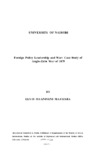| dc.contributor.author | Mathaba, Elvis Mfaniseni | |
| dc.date.accessioned | 2016-06-21T14:35:11Z | |
| dc.date.available | 2016-06-21T14:35:11Z | |
| dc.date.issued | 1993 | |
| dc.identifier.uri | http://hdl.handle.net/11295/96234 | |
| dc.description.abstract | TheBritish imperial policy of colonising smaller, weaker and less developed nations was the
underlying cause of the Anglo-Zulu War. The imperial policy allowed British agents,
including the military, to use unrestricted amount of violence to deal with nations resisting
colonial authority. Leaders who used violence against natives without express British
government authority with success were rewarded with decorations and career advancement.
Those who failed or caused loss of British lives were lightly reprimanded and/or redeployed.
The declaration and the waging of the Anglo-Zulu War was in line with the British policy of
using violence against native states perceived as a threat to imperial interests.
Leadership was pivotal in the occurrence of the Anglo-Zulu War. It was power
relations and interactions between various British and Zulu leaders that resulted in Britons
and Zulus going to war. The manner in which Carnarvon was advised to bring about the
confederation of Southern African states caused the Anglo-War. Actions and decisions
taken by various leaders led to a violent confrontation between the two nations.
Decision-making processes within the imperial system facilitated the waging of the
war without the express British government authority. The colonial office under
Carnarvon's leadership was able to conceive the confederation concept and allocated
resources for its implementation without any political oversight. Colonial officials were
allowed to make and implement decisions in the colonies without London's approval. A
hurried attempt to implement the confederation was the direct cause of the Anglo-Zulu War.
Bartle Frere and Chelmsford were appointed for the sole purpose of dealing with the Zulus.
Decisions taken by the Zulu kings, particularly Mpande and Cetshwayo facilitated an easy
British victory. | en_US |
| dc.language.iso | en | en_US |
| dc.publisher | University Of Nairobi | en_US |
| dc.rights | Attribution-NonCommercial-NoDerivs 3.0 United States | * |
| dc.rights.uri | http://creativecommons.org/licenses/by-nc-nd/3.0/us/ | * |
| dc.title | Foreign Policy Leadership and War: Case Study of Anglo-Zulu War of 1879 | en_US |
| dc.type | Thesis | en_US |



